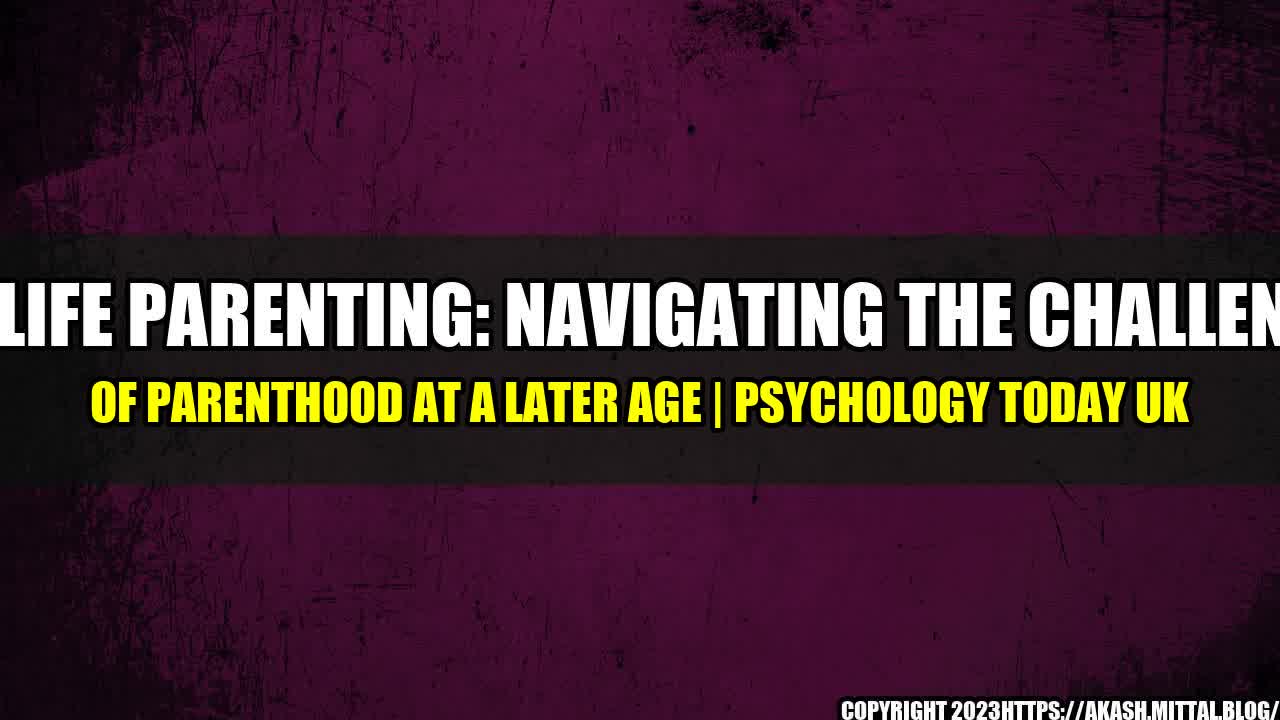Jackie always thought she was done having kids. She had two children, a son and a daughter, when she was in her twenties, and had since taken on a busy career in finance. But at the age of 42, she found herself unexpectedly pregnant.
At first, Jackie was overwhelmed by the news. She worried about how having a baby at her age would impact her career, her finances, and her relationship with her husband, who was also in his forties. But as the pregnancy progressed, Jackie started to feel excited about the prospect of becoming a mother again.
When her son was born, Jackie found that her experience of midlife parenting was very different from when she had been a younger mother. She was more confident in her abilities to care for her child, and had a greater sense of perspective about what was truly important. She was also more patient and calm, and found that she was able to enjoy the experience of parenthood in ways she hadn't been able to before.
Jackie's story is not unusual. Increasingly, people are choosing to have children later in life, whether it be because of career demands, financial stability, or simply personal choice. But midlife parenting comes with unique challenges, as well as opportunities for growth and fulfillment. In this article, we'll explore some of the key aspects of parenting at a later age, and provide tips and examples for navigating the ups and downs.
Challenges of Midlife Parenting
One of the biggest challenges of midlife parenting is the physical toll it can take on the body. Women who become pregnant later in life are at higher risk for complications such as gestational diabetes, preeclampsia, and preterm birth. Men who become fathers in their forties and beyond are more likely to have children with genetic mutations and developmental disorders.
Financial concerns can also be a challenge for midlife parents. Starting a new family can be expensive, and many parents find themselves juggling the costs of childcare, education, and retirement savings. Midlife parents may also need to continue working longer than their peers in order to support their growing families.
Midlife parents may also feel isolated from their peers, who may have grown children or be in a different phase of life. It can be difficult to relate to other parents who are dealing with issues such as college tuition or empty nest syndrome, when you're knee-deep in diapers and sleepless nights.
The Upside of Midlife Parenting
Despite the challenges, midlife parenting can also provide unique opportunities for personal growth and fulfillment.
For example, midlife parents may have more emotional maturity and life experience than younger parents, which can make them better equipped to handle the ups and downs of parenthood. They may also have more financial stability and career success, which can provide their children with more opportunities and a better quality of life.
Midlife parenting can also provide a sense of purpose and connection that may have been lacking earlier in life. For some people, starting a family later in life can be a way to fill a gap that has been left by career success, divorce, or other life changes. Having a child can also provide a sense of continuity and legacy, as well as a deeper appreciation for the passage of time and the importance of family.
Tips for Navigating Midlife Parenting
If you're becoming a parent in midlife, here are some tips for navigating the challenges and maximizing the opportunities:
- Take care of your body. Eat well, exercise regularly, and get plenty of sleep. Talk to your doctor about any health concerns you may have, and stay on top of prenatal care if you're pregnant.
- Get your finances in order. Start saving early, and create a budget that takes into account the costs of childcare, education, and retirement. Consider working with a financial advisor or planner to help you meet your goals.
- Build a support network. Connect with other midlife parents through groups, social media, or online forums. Talk to your partner, family members, or friends about your concerns and challenges. Consider hiring a nanny or babysitter to provide some relief when you need it.
- Stay up to date on the latest research and information about midlife parenting, particularly if you're dealing with specific health or developmental concerns. Talk to your doctor, therapist, or other professionals if you need guidance or support.
- Take advantage of the benefits of midlife parenting, such as your emotional maturity, life experience, and financial stability. Use these assets to provide your child with the best possible start in life.
Conclusion
- Midlife parenting can be challenging, but it can also be a time of great joy and personal growth.
- Key challenges of midlife parenting include physical health concerns, financial pressures, and feelings of isolation or disconnection from peers.
- Benefits of midlife parenting include emotional maturity, life experience, financial stability, and a sense of purpose and connection.
By taking care of your body, getting your finances in order, building a support network, staying informed, and taking advantage of your unique assets, you can navigate the challenges of midlife parenting and create a fulfilling and rewarding experience for yourself and your child.

Curated by Team Akash.Mittal.Blog
Share on Twitter Share on LinkedIn